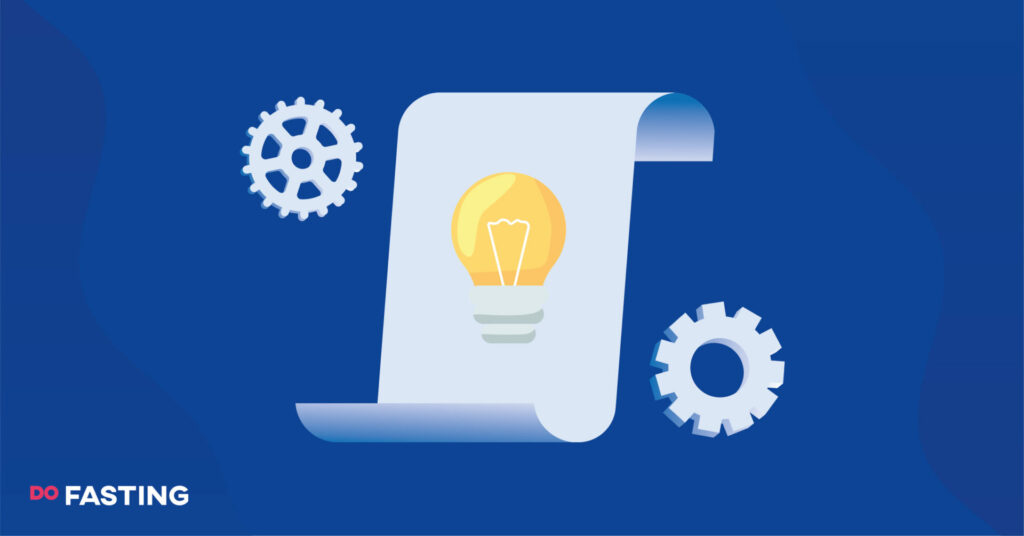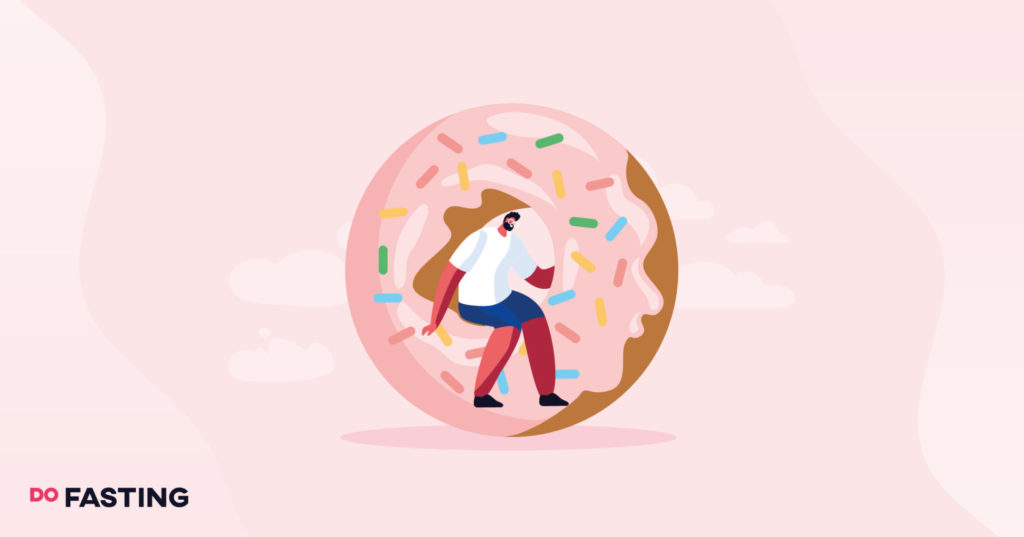Contents
Why Can Intermittent Fasting Cause Constipation?
Constipation generally means fewer than three bowel movements per week. It is difficult to pass stool, and symptoms may include hard stools, excessive straining, a feeling of blockage, incomplete evacuation of the bowels, abdominal pain, and bloating.
Of course, intermittent fasting is not the only cause of constipation. It could result from a medical condition, such as thyroid disorder or irritable bowel syndrome. It’s best to speak to your doctor about possible underlying bowel problems.
Below are 6 potential causes behind this common side effect.
Take a
1-minute quiz
and discover how much weight you can lose with DoFasting!

Not getting enough fiber
Dietary fiber is a vital nutrient for your overall health and digestive system.
It is a non-digestible carbohydrate that passes through the digestive tract, acting as a scrubbing brush that cleans the colon. It flushes bacteria and waste buildup while bulking and softening stool consistency, ensuring food passes through easily.
Poor dietary fiber intake is often to blame for irregular bowel movements. During intermittent fasting, it is essential to include enough fiber in your diet to keep your digestive system healthy. As well as constipation, other side effects of a deficiency include:
- Diarrhea
- Bloating
- Hunger pangs
- Low energy
- Fatigue
Not drinking enough water
Drinking water is a requisite of intermittent fasting. It is necessary for your body’s everyday functions, including healthy bowel movements. A lack of water in the fasting period is a primary cause of chronic constipation.
When there is not enough water in your system, the large intestine absorbs the water from your food waste. There is not enough water to add to stools, leaving them hard, dry, and difficult to pass.
Drinking enough water is especially important when fasting because you no longer acquire water from your usual food intake.
During intermittent fasting, you are also more prone to losing electrolytes and fluids. As insulin levels drop, the body excretes large amounts of water and sodium through the kidneys, causing dehydration.
Other dehydration side effects when fasting intermittently include:
- Dry mouth
- Excessive thirst
- Headaches
- Bloating
- Fatigue
Overeating milk or cheese
Overeating dairy-based products in the eating window can bring constipation in some individuals. It may result from an allergy or sensitivity to the proteins present in cow’s milk. In approximately 30% of cases, constipation is a symptom of lactose intolerance.
Depending on the cause, you don’t necessarily need to cut out milk and cheese altogether. You can adapt your diet by monitoring and reducing your dairy consumption. Try substituting with plant-based alternatives, and see if it helps.
Not enough exercise
It’s not all about diet. A lack of physical activity and a sedentary lifestyle can trigger abnormal bowel movements. Exercise speeds things up, reducing the time stool takes to travel through the digestive tract and decreasing the amount of water absorbed.
Exercise can also encourage bowel movement by stimulating the intestinal muscles. Ultimately, regular physical activity keeps the colon happy and functioning properly.
Furthermore, getting enough exercise can help you get better intermittent fasting results by increasing your calorie burn and accelerating weight loss.
Stress
Psychological problems often cause physical symptoms.
Stress can upset your gut and make bowel movements challenging. It can cause or worsen existing constipation for several reasons, from reducing blood flow to the intestines to triggering inflammation.
Moreover, stress may cause a person to eat an unhealthy diet, refrain from exercise, and struggle to sleep – all contributing to fewer bowel movements.
Medications
Certain medications can influence constipation. Popular medicines known to cause bowel problems include:
- Antidepressants affect the nerve endings in the gut, causing gastrointestinal side effects.
- Opioid drugs inhibit bowel movements due to a lack of fluid in the intestines.
- Iron supplementation is commonly associated with constipation and other digestive issues.
- Blood pressure medications, notably calcium channel blockers and beta blockers, can make you constipated by relaxing the gut muscles.
- Anticholinergic medications also relax the muscles in the gut.
Take a
1-minute quiz
and discover how much weight you can lose with DoFasting!

5 Tips to Reduce Constipation During Intermittent Fasting
The good news is that you can try many remedies to mitigate poop problems and make your stool easier to pass.
Here are 5 tips for practicing intermittent fasting.
1. Add high-fiber foods to your diet
When intermittent fasting, you should aim to get at least the daily recommended dose of fiber in your eating window, which is 21–25 grams for women and 30–38 grams for men. Prioritizing your fiber intake will make your stool easier to pass.
You can implement a meal plan with plenty of foods high in this essential nutrient. Examples include:
- Whole grains like barley, buckwheat, oatmeal, brown rice, and whole wheat bread
- Legumes, nuts, and seeds
- High-fiber fruits, such as raspberries, strawberries, apples, and bananas
- High-fiber vegetables, such as broccoli, Brussels sprouts, cauliflower, and sweet potatoes
You can also boost your fiber intake with recipes from the DoFasting app that specifically focus on your health during intermittent fasting. The app also allows you to count macros to reach your daily goals.
And if you’re interested in supplementation, DoFasting’s Essential Fiber Complex serves as an appetite suppressant while combating fiber deficiencies.
2. Avoid refined food
While intermittent fasting focuses on when you eat, it is still vital to consider what to and what not to eat. Constipation is often directly related to the foods we eat, so you must get enough nutrients from whole foods to support your gut.
Refined food has no place in a healthy diet. Foods to avoid in an intermittent fasting plan are:
- White bread, white rice, and white pasta
- Breakfast cereals
- Bagels and pastries
- Processed meats
- Potato chips
- Candy
- Sugary drinks
Instead, you should center your diet around whole grains, lean proteins, healthy fats, fruits, and vegetables.
3. Stay hydrated
Healthy adults should drink enough water every day to stay properly hydrated. The daily recommendation for women is 11.5 cups (2.7 liters) and 15.5 cups (3.7 liters) for men.
As you lose more water with intermittent fasting, you should drink additional water. Three to four liters per day is sufficient for most people. You can also stay hydrated and avoid dehydration with other fast-friendly drinks.
4. Drink coffee, tea, and other caffeinated drinks
Caffeinated beverages can help with constipation as caffeine has a mild laxative effect. As a natural stimulant, it can stimulate the muscles in the digestive system to contract and produce a bowel movement.
A cup of coffee or tea can benefit intermittent fasting, giving you an energy boost without breaking your fast.
5. Exercise
Adults should get 150 minutes of moderate to intense exercise every week. You can split the time into schedules, such as 30 minutes a day, 5 days per week. Regular exercise will aid digestion and help keep your bowel movements steady.
You may not have as much energy as usual during intermittent fasting to complete a workout. Try gentler exercises such as walking, jogging, pilates, and yoga in the fasted state. This will keep your muscles strong without exhausting your body.
When Should You Consult a Doctor?
You can usually treat and prevent constipation at home, but if you don’t have a bowel movement for a prolonged period – speak to your doctor.
Sometimes, constipation becomes serious, and you may require emergency care. Alongside constipation, warning signs that constitute emergency care include:
- Dark, tarry stool or blood in the stool
- Severe or chronic abdominal pain
- Major bloating
- Vomiting
Take a
1-minute quiz
and discover how much weight you can lose with DoFasting!

Conclusion
Intermittent fasting has many benefits, from weight loss to decreased inflammation. It’s true, however, that the diet may trigger constipation. The human body is sensitive, and a sudden change in your eating habits can throw your bowel movements out of sync.
It is usually temporary and only occurs in the initial days or first few weeks of starting intermittent fasting. Once your body adapts to your new eating pattern, and you take steps to support your gut health, you can expect your bathroom schedule to return.
See how DoFasting will improve your life
Find out what works for you with this 60-sec quiz approved by our experts and get your personal revolutionary fasting assistant.
Start the Quiz
This is an evidence-based article that includes scientific citations. DoFasting’s professional writers and editors prepared the content, which a team of medical experts verified to be accurate.















